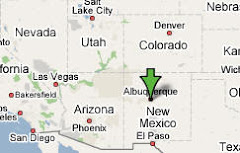
Upon returning from a wonderful week of family and friends in the Bay Area, Jon and I decided to spend our first Saturday back home at the
New Mexico Museum of Natural History. While I grew up here in Albuquerque, I think I've only visited this museum twice--and one of those times was in a little black dress for senior prom--so for me it was like visiting for the very first time.
We strolled through an exhibit that showed how the weather works (where wind comes from, the effects of different kinds of cloud formations, etc.), then went on to a coral reef photo exhibit, onward to
stalagmites and stalactites in a simulated cave, an astronomy exhibit, and finally into the history of the universe--from the
Big Bang to the dinosaurs to their extinction. This is where we started our Great Debate.
Not only was the museum like a new experience to me, but this was the first I had heard of the
K-T Boundary and the
Chicxulub asteroid impact, a theory for why dinosaurs suddenly disappeared from the earth. The theory is relatively new, surfaced and debated in just the past 30 years with additional theories surfacing since 2000, so I guess I had been so wrapped up in earning my English degree, getting a job, moving around, and living daily life, that I missed this one. Or, blame it on the public school system (truly, I don't remember learning about any of this in any of my science classes, and I paid good attention in school).
I had of course learned about the Big Bang, but the Chicxulub impact theory is different--it's not about the origin of the universe, rather it's an explanation for why dinosaurs suddenly disappeared. I didn't know that this one theory was so institutionalized as to take up a good portion of the science museum. Of course, this sent my mind reeling in the possibilities and what this all means to my belief system (yes, you could call me a subscriber to
Intelligent Design, or Creationism: I'm open to learning about new scientific evidence and theories--I just believe a higher being could have been responsible for all of this. It's not impossible!).
So the Great Debate for me and Jon goes like this: science is almost like religion in that it takes some faith to believe in scientific theories. Like religion, science evokes so many questions for which we may never have the answers. Jon's opinion: science is fact. My opinion: science can take just as much faith as religion does, and isn't always fact. Scientific theories are disproven or change all the time (for example, the K-T boundary is now called the
K-Pg boundary due to recent findings). There are certain laws of science that have been proven: Newton's
three laws of motion, the
Third Law of Thermodynamics,
Avogadro's Law, etc., but when it comes down to it, science and religion are both ways for humans to make sense of how we got here, where time began, where it's going, whether or how it will end, etc.
These are the kinds of things Jon and I talk about as we stroll through places like the Natural History Museum. Call us boring, but it's really quite fun talking about subjects like these, with two different opinions. We agree to disagree so it doesn't get nasty; but we never end up feeling satisfied with each other's answers, so it keeps us going, keeps us learning.
With Jon returning to school in the spring to work toward his Earth Sciences degree (focus on
hydrology), we'll likely have a lot more conversations like these. So prepare to be bored with more blog entries like this in 2009 :-)
On a closing note, while reading a
National Geographic article on the Chicxulub impact, I found this quote from a scientist who controversially introduced one of several other theories than the K-T (or K-Pg?) event for sudden dinosaur extinction:
"This is more religion than anything else," [Princeton University paleontologist Gerta Keller] says. "A lot of people are so wedded to [the Chicxulub] theory that it seems that no evidence can ever convince them of anything else."
I guess I'm not the only one who thinks that science can be a religion of its own.





